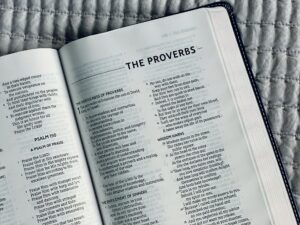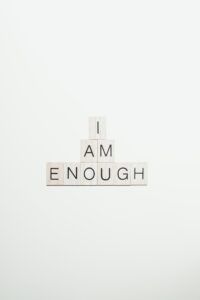There’s a biblical proverb that says, “One who has unreliable friends soon comes to ruin, but there is a friend who sticks closer than a brother” (Proverbs 18:24, NIV). Not all friendships are created equal; some friends are unreliable, while others share a bond stronger than even familial relationships. Your friendships could ruin you, but they can also be a necessary support for a rich and fulfilling life.
The result of all this is that friendships are great, but you need to exercise caution. There are some relationship dynamics, such as codependency, that you need to keep an eye on. These unhealthy dynamics not only affect your well-being, but they can also lead to poor choices that affect the course of your life. ‘Ruin’ may seem like a strong word, but unwise relationships can cause enormous amounts of damage.
What’s at the core of codependency?
 The term ‘codependency’ is one that’s gained currency in the last decade or so. It describes a variety of unhealthy relationship behaviors that can be caused in several ways. However, at the heart of codependency is an underdeveloped or poor sense of self. If a person doesn’t develop a clear sense of who they are, their values, and their boundaries, they are more prone to developing codependent patterns of behavior in relationships with others.
The term ‘codependency’ is one that’s gained currency in the last decade or so. It describes a variety of unhealthy relationship behaviors that can be caused in several ways. However, at the heart of codependency is an underdeveloped or poor sense of self. If a person doesn’t develop a clear sense of who they are, their values, and their boundaries, they are more prone to developing codependent patterns of behavior in relationships with others.
Codependency and codependent behaviors involve a complicated mix of psychological, emotional, and relational dynamics that are at work in day-to-day interactions. Some of these include the desire to seek validation and approval externally from other people. Other dynamics include over-identifying and being enmeshed with others to the point where it’s hard to tell where they end, and you begin.
Codependency also includes a fear of rejection or abandonment, an inability to self-regulate one’s own emotions, poor emotional resilience, difficulty setting and maintaining good boundaries with others, and having low self-worth and self-esteem. In codependent relationships, there is a power imbalance and control issues, along with dysfunctional communication patterns like passive-aggressive behavior and criticism.
A codependent relationship is thus an unhealthy relationship. It doesn’t lend itself to one or both members flourishing. Often, the codependent dynamic serves to deepen unhealthy patterns of behavior that don’t shore up a healthy sense of self, nor does it promote a healthy self-sufficiency.
Some Underlying Causes of Codependency
 There isn’t a single and straightforward path toward codependency. A person develops a poor sense of self and has difficulty maintaining healthy boundaries with others for a variety of reasons. The process of developing a healthy sense of self was often disrupted by experiences such as childhood trauma or experiences such as abandonment, or neglect. These can be in the form of a parent dying, parental divorce, or being literally abandoned.
There isn’t a single and straightforward path toward codependency. A person develops a poor sense of self and has difficulty maintaining healthy boundaries with others for a variety of reasons. The process of developing a healthy sense of self was often disrupted by experiences such as childhood trauma or experiences such as abandonment, or neglect. These can be in the form of a parent dying, parental divorce, or being literally abandoned.
Experiencing unhealthy family dynamics like parental substance abuse disorder or neglectful or inattentive parents can also lead to codependent behavior. In some cases, the child takes on the role of the parent to take care of themselves and their siblings in the place of the dysfunctional parent. The child learns to place themselves and their needs and wants after others.
Codependency can also develop as a result of an insecure attachment style. An attachment style is how you form and maintain relationships with others. An insecure attachment style may include a fear of abandonment. It leads to seeking reassurance of a loved one’s affections and also going above and beyond what’s healthy to keep a partner happy.
Depending on your situation, societal or cultural expectations can also play a role in nurturing codependency. If, for instance, there’s more of an emphasis on the collective – society, your local community, or the family – over the individual, that may lead to codependent behaviors. While it’s important to look out for others and love them well, it can be detrimental to do so without regard to personal well-being.
 In addition to the above, personal values and beliefs can also lean into codependent dynamics. For instance, personal or religious beliefs could lead to an emphasis on self-sacrifice. If a person is a people pleaser who is unwilling or unable to say “no,” that too could lead to a situation of codependency.
In addition to the above, personal values and beliefs can also lean into codependent dynamics. For instance, personal or religious beliefs could lead to an emphasis on self-sacrifice. If a person is a people pleaser who is unwilling or unable to say “no,” that too could lead to a situation of codependency.
Lastly, substance abuse or addiction, and dealing with mental health conditions such as anxiety or depression, may also lead to codependency, though via different routes. You may become overly reliant on others for day-to-day functioning due to these conditions. If you’re not intentional, those patterns may persist even after recovery. We all need help at one point or another, but it’s possible to lean into that pattern of need more than is necessary.
A person may thus form codependent patterns of relating to others when they’re young, but these patterns can also develop and set in later in life as well.
Signs of Codependency in Friendships
Being friends with someone means that you will help each other in a bind. Friends help each other, support one another in times of crisis, challenge unhealthy behaviors in each other, enjoy common interests together, and help one another become what the Lord intends for them to be. However, there are helpful and there are unhelpful and unhealthy ways to be present in someone’s life.
Some patterns of codependent behavior to look out for include:
- It is difficult for you to say “no” to your friend or set limits to what you’re willing to do with and for them.
- You perform enabling or rescuing behaviors toward your friend. Consistently swooping in to help your friend out of a jam of their own making.
- In line with the inability to say “no,” you exhibit people-pleasing behavior and over-accommodate your friend.
- Because of the inability to say “no,” you may lack the practice of self-care or prioritizing personal goals.
- You feel overly responsible for your friend’s emotions or actions.
- You feel emotionally or physically drained after interactions or time spent with your friend.
- A fear of abandonment can result in the codependent tendency to tolerate abusive or toxic behavior from your friend, such as constant criticism, humiliation, being insulted, or being manipulated.
- You have a fear of conflict or confrontation. This might look like faking agreement and not being willing to hold or express opinions or thoughts that are contrary to your friend.
- You display passive-aggressive behavior toward your friend instead of telling them what you truly think and feel. Instead of being vulnerable, you express yourself and your feelings of anger in subtle, subversive ways. You may harbor feelings of resentment and anger toward your friend.
Codependent relationships can leave you feeling emotionally and physically burned out. They can also strain other relationships because of how all-consuming they can be. Not only do such relationships increase a person’s levels of anxiety or stress, but they also can increase the risk of depression. Codependency reinforces a loss of personal identity and autonomy.
Recovering from Codependent Patterns in a Friendship
 A friendship, even a good friendship, can be overcome by codependent dynamics. If a friend is in trouble and you bail them out, that’s one thing. However, if you begin to fall into that pattern of relating to each other, a codependent dynamic can develop. A healthy friendship can become codependent in several ways, or it might commence between two people with codependent tendencies and patterns of behavior. Recovery, however, is possible.
A friendship, even a good friendship, can be overcome by codependent dynamics. If a friend is in trouble and you bail them out, that’s one thing. However, if you begin to fall into that pattern of relating to each other, a codependent dynamic can develop. A healthy friendship can become codependent in several ways, or it might commence between two people with codependent tendencies and patterns of behavior. Recovery, however, is possible.
Recovering from codependency is, among other things, about becoming more aware of the fact that your pattern of behavior with your friend is an unhealthy one. With introspection and spending time to be more self-aware, you could pinpoint how your relationship dynamic is unhealthy.
Apart from self-awareness, it’s important to put practices in place that will help you recover and develop a more secure sense of self. This includes taking steps such as boundary-setting and learning to be more assertive. It also means taking time out for self-care and prioritizing yourself, rebuilding your self-worth and self-esteem, and developing healthy communication skills so that you can express your thoughts and emotions well.
You can make use of support groups where you can share your concerns and learn from others. It may be necessary to take a break from your friendship so that you both can seek help. Both of you need to be willing to change things about yourself for the dynamics to change.
You and your friend can seek professional help to build resilience and other skills. Through individual counseling, you can build a healthy friendship. If you are ready for that step today, contact our office. We can set up an appointment to get you started with one of the therapists in our practice.
Photos:
“Proverbs”, Courtesy of Tim Wildsmith, Unsplash.com, CC0 License; “Friends”, Courtesy of Priscilla Du Preez, Unsplash.com, CC0 License; “I Am Enough”, Courtesy of Valeriia Miller, Unsplash.com, Unsplash+ License; “Counseling Teen”, Courtesy of Andrej Lišakov, Unsplash.com, Unsplash+ License
-
Craig Meisner: Author
I offer Christian counseling for couples, adult individuals, and teens facing a variety of issues and concerns including relationship issues, anxiety, depression, trauma, and much more. I strive to provide a safe, nurturing, and positive environment...
-
Kate Motaung: Curator
Kate Motaung is the Senior Writer, Editor, and Content Manager for a multi-state company. She is the author of several books including Letters to Grief, 101 Prayers for Comfort in Difficult Times, and A Place to Land: A Story of Longing and Belonging...
DISCLAIMER: THIS ARTICLE DOES NOT PROVIDE MEDICAL ADVICE
Articles are intended for informational purposes only and do not constitute medical advice; the content is not intended to be a substitute for professional medical advice, diagnosis, or treatment. All opinions expressed by authors and quoted sources are their own and do not necessarily reflect the opinions of the editors, publishers or editorial boards of Stone Oak Christian Counseling. This website does not recommend or endorse any specific tests, physicians, products, procedures, opinions, or other information that may be mentioned on the Site. Reliance on any information provided by this website is solely at your own risk.









